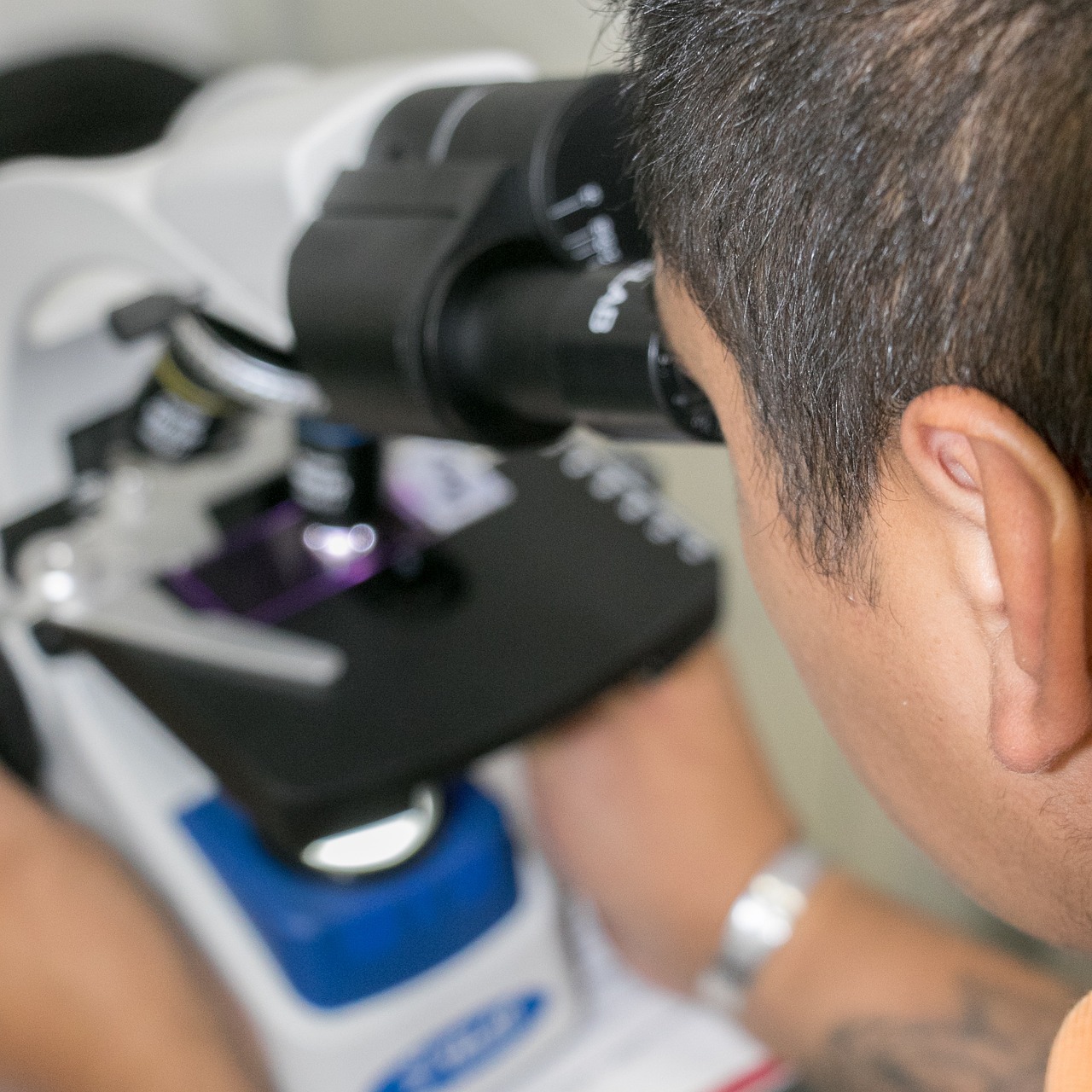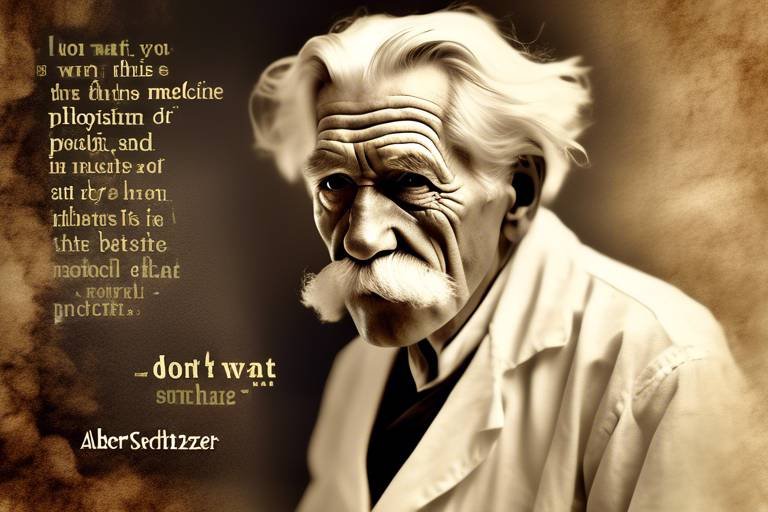The Discoveries of Robert Koch in Microbiology
Robert Koch, a name synonymous with the birth of modern microbiology, has made significant strides that have reshaped our understanding of infectious diseases. Born on December 11, 1843, in Clausthal, Germany, Koch's journey into the world of science was marked by a relentless curiosity and a quest for knowledge. This article explores his groundbreaking contributions to microbiology, detailing pivotal discoveries, methodologies, and their lasting impact on medicine and public health.
From an early age, Koch displayed a keen interest in the natural sciences. After completing his medical degree in 1866, he began his career as a physician, but it was his passion for research that truly set him apart. Working in various hospitals and laboratories, Koch honed his skills in microscopy and bacteriology. His dedication led him to study the causes of diseases such as anthrax and tuberculosis, which would ultimately earn him a place in the annals of scientific history. Koch's relentless pursuit of answers to pressing medical questions laid the groundwork for a new era in the understanding of infectious diseases.
One of Koch's most significant contributions to microbiology is the formulation of what are now known as Koch's postulates. These are four criteria designed to establish a causative relationship between a microbe and a disease. The postulates are as follows:
- The microorganism must be found in abundance in all organisms suffering from the disease, but should not be found in healthy organisms.
- The microorganism must be isolated from a diseased organism and grown in pure culture.
- The cultured microorganism should cause disease when introduced into a healthy organism.
- The microorganism must be re-isolated from the inoculated, diseased experimental host and identified as being identical to the original specific causative agent.
This systematic approach not only validated the germ theory of disease but also laid the foundation for modern microbiological research. By establishing these criteria, Koch provided a clear methodology for scientists to identify the pathogens responsible for various diseases, thus revolutionizing the field.
The importance of Koch's postulates cannot be overstated. They served as a cornerstone for validating the germ theory, which posits that many diseases are caused by microorganisms. This was a radical shift in thinking at the time, moving away from the belief that diseases were caused by miasmas or imbalances in bodily humors. Koch's postulates influenced countless studies and research efforts in microbiology and infectious diseases, guiding scientists in their quest to understand and combat pathogens.
Koch's postulates have been instrumental in identifying the causative agents of various infectious diseases. For instance, they were crucial in the identification of the bacteria responsible for cholera and syphilis. By applying these criteria, researchers could enhance diagnostic methods in medicine, leading to more effective treatments and public health strategies. The ability to pinpoint the exact pathogen behind an illness has allowed for targeted interventions, saving countless lives.
However, it's essential to acknowledge that Koch's postulates are not without limitations. In some cases, particularly with polymicrobial infections or asymptomatic carriers, applying these criteria becomes challenging. For example, infections like those caused by the human immunodeficiency virus (HIV) or certain strains of bacteria that coexist in a single infection complicate the straightforward application of Koch's postulates. This highlights the evolving nature of microbiology and the need for continued research and adaptation of methodologies.
Koch's work laid the foundation for bacteriology as a distinct scientific discipline. He introduced innovative methods for isolating and culturing bacteria, including the use of agar plates, which are still in use today. His meticulous techniques allowed for the growth of pure bacterial cultures, enabling scientists to study specific organisms in detail. This advancement not only facilitated research but also paved the way for the development of vaccines and antibiotics, transforming the landscape of medicine.
One of Koch's most notable achievements was the discovery of Mycobacterium tuberculosis, the bacterium responsible for tuberculosis. In 1882, Koch presented his findings to the Berlin Physiological Society, marking a pivotal moment in medical history. His discovery was not just a scientific triumph; it had profound implications for public health and disease control. Before Koch's work, tuberculosis was often considered a death sentence, but his identification of the causative agent opened the door for new treatment strategies and public health initiatives.
Koch's findings on tuberculosis transformed public health policies and practices. His work led to increased awareness of the disease and its transmission, prompting governments to implement sanitation measures and public health campaigns. The focus shifted towards improving living conditions, promoting hygiene, and isolating infected individuals to prevent further spread. These changes significantly reduced the incidence of tuberculosis and improved the overall health of populations.
The advancements in tuberculosis treatment that stemmed from Koch's discovery are noteworthy. His work laid the groundwork for the development of vaccines, such as the BCG vaccine, and the discovery of antibiotics that target Mycobacterium tuberculosis. These innovations have been instrumental in controlling and treating tuberculosis, turning a once-deadly disease into a manageable condition for many.
Robert Koch's legacy in microbiology is enduring. His Nobel Prize-winning work continues to influence contemporary science and medicine. The methodologies he developed and the diseases he studied laid the groundwork for future generations of researchers. Today, Koch's discoveries resonate in the ongoing fight against infectious diseases, reminding us of the importance of rigorous scientific inquiry and the impact it can have on public health.
- What are Koch's postulates? Koch's postulates are a series of criteria established by Robert Koch to link specific pathogens to specific diseases.
- Why are Koch's postulates important? They provide a systematic method for identifying the causative agents of diseases, validating the germ theory of disease.
- What disease did Koch discover the causative agent for? Koch discovered the bacterium responsible for tuberculosis, Mycobacterium tuberculosis.
- How has Koch's work impacted public health? His discoveries led to improved sanitation, disease prevention measures, and advancements in treatment for infectious diseases.

Introduction to Robert Koch
Robert Koch, born on December 11, 1843, in Clausthal, Germany, is often hailed as the father of modern microbiology. His journey into the world of science began in a modest setting, where he was the second of thirteen children. Despite the challenges of a large family, Koch's parents encouraged his education, leading him to study medicine at the University of Göttingen. After completing his studies, he worked as a physician in various rural locations, where he encountered numerous infectious diseases that would later shape his career.
Koch's early experiences in medicine were pivotal in developing his interest in microbiology. In the 1860s, he began to delve deeper into the study of bacteria, a field that was still in its infancy. His fascination with the microscopic world led him to conduct experiments that would eventually revolutionize the understanding of infectious diseases. At a time when many believed diseases were caused by miasmas or imbalances in bodily humors, Koch was among the first to propose that specific microorganisms were responsible for specific diseases.
In 1876, Koch made a groundbreaking discovery that would cement his place in history: he identified the causative agent of anthrax, a deadly disease affecting livestock and humans. This was not just a scientific achievement; it was a turning point in medical history. Koch's meticulous methods and dedication to isolating the bacterium paved the way for future research and laid the groundwork for the germ theory of disease. His work was characterized by a systematic approach that included:
- Isolation of the pathogen from infected individuals
- Culture of the organism in a pure form
- Demonstration of the disease in a healthy host
- Re-isolation of the pathogen from the newly infected host
These steps would later be formalized into what we now know as Koch's postulates, a set of criteria that remain foundational in microbiological research today. Koch's contributions did not stop there; his relentless pursuit of knowledge led to the discovery of several other pathogens, including the infamous Mycobacterium tuberculosis, the bacterium responsible for tuberculosis.
As we explore Koch's life and work, it's essential to recognize not just his scientific achievements but also the broader impact of his discoveries on public health and medicine. His legacy is a testament to the power of curiosity and the scientific method, which continues to inspire researchers and healthcare professionals around the world. Koch's story is one of perseverance, innovation, and an unwavering commitment to understanding the unseen world of microorganisms.

Koch's Postulates
One of the most significant contributions to microbiology comes from the brilliant mind of Robert Koch, who established a framework known as . These postulates serve as a set of criteria designed to link specific pathogens to specific diseases, fundamentally transforming our understanding of infectious diseases. Imagine trying to solve a mystery without a clear set of clues; Koch provided the detective work needed to identify the culprits behind various ailments. His meticulous approach not only advanced the field of microbiology but also laid the groundwork for modern medical practices.
Koch's Postulates consist of four essential criteria that must be met to establish a causal relationship between a microbe and a disease. They are as follows:
- The microorganism must be found in abundance in all organisms suffering from the disease, but should not be found in healthy organisms.
- The microorganism must be isolated from a diseased organism and grown in pure culture.
- The cultured microorganism should cause disease when introduced into a healthy organism.
- The microorganism must be re-isolated from the inoculated, diseased experimental host and identified as being identical to the original specific causative agent.
These postulates formed the backbone of bacteriology and provided a systematic method to identify pathogens. Think of them as a roadmap guiding researchers through the labyrinth of infectious diseases. By adhering to these principles, scientists could confidently ascertain the causative agents of diseases, leading to groundbreaking discoveries in treatment and prevention.
The significance of Koch's Postulates cannot be overstated. They played a pivotal role in validating the germ theory of disease, which posits that microorganisms are the primary causes of many diseases. This was revolutionary at a time when many believed diseases were caused by miasmas or imbalances in bodily humors. Koch's work shifted the scientific community's perspective, leading to a deeper understanding of how infections spread and how they could be controlled.
Furthermore, these postulates influenced countless subsequent studies in microbiology and infectious diseases. They became the gold standard for establishing the link between pathogens and diseases, guiding researchers in their quest to combat infectious agents. For example, the identification of the bacterium responsible for anthrax and its link to livestock deaths was a direct application of Koch's Postulates, showcasing their practical utility in real-world scenarios.
Koch's Postulates have been instrumental in identifying the causative agents of various infectious diseases. The systematic approach allows scientists to isolate pathogens and examine their effects on host organisms. This has enhanced diagnostic methods in medicine significantly. For instance, when a patient presents symptoms of a disease, clinicians can refer to Koch's criteria to determine the likely infectious agent. This methodical process not only aids in diagnosis but also informs treatment options, ensuring that patients receive the most effective care.
However, it's essential to recognize that Koch's Postulates are not without limitations. In some cases, such as polymicrobial infections, where multiple pathogens contribute to a disease, applying these criteria becomes challenging. Additionally, asymptomatic carriers can harbor pathogens without showing any signs of illness, complicating the straightforward application of Koch's principles. These nuances highlight the evolving nature of microbiological research and the need for continual adaptation of methodologies to address new challenges.
In summary, Koch's Postulates represent a monumental leap in the understanding of infectious diseases, providing a structured approach to identifying pathogens and establishing their roles in disease causation. While they have limitations, their impact on the field of microbiology and public health remains profound and enduring.

Significance of Koch's Postulates
Robert Koch's postulates are not just a set of guidelines; they represent a monumental leap in our understanding of infectious diseases. Established in the late 19th century, these postulates provided a systematic method for linking specific pathogens to specific diseases. This was revolutionary at a time when the germ theory of disease was just beginning to gain traction. Imagine trying to solve a mystery without any clues—Koch's postulates provided the framework that transformed the chaotic world of infectious disease into a more orderly and scientific discipline.
By articulating these criteria, Koch laid the groundwork for modern microbiological research. He asserted that to establish a causative relationship between a microbe and a disease, one must demonstrate the following:
- The microorganism must be found in abundance in all organisms suffering from the disease, but should not be found in healthy organisms.
- The microorganism must be isolated from a diseased organism and grown in pure culture.
- The cultured microorganism should cause disease when introduced into a healthy organism.
- The microorganism must be re-isolated from the inoculated, diseased experimental host and identified as being identical to the original specific causative agent.
This structured approach not only validated the germ theory but also equipped scientists and medical professionals with a reliable method to identify pathogens. The significance of Koch's postulates extends beyond mere academic exercise; they have had profound implications in the realm of public health. For instance, understanding the specific causative agents of diseases allowed for the development of targeted treatments and preventive measures, which have saved countless lives.
Moreover, Koch's postulates have influenced the design of laboratory experiments and clinical studies. They serve as a benchmark for evaluating the relationship between pathogens and diseases, fostering a more rigorous approach to scientific inquiry. As we delve deeper into the complexities of microbiology, it becomes clear that these postulates remain a cornerstone of infectious disease research, guiding scientists in their quest to uncover the mysteries of pathogens.
However, it's crucial to acknowledge that Koch's postulates are not without their limitations. In today's world, we encounter numerous challenges that were not considered during Koch's time, such as polymicrobial infections and asymptomatic carriers. These complexities necessitate a more nuanced understanding of infectious diseases, prompting researchers to adapt and expand upon Koch's original framework. Yet, the essence of Koch's postulates continues to resonate, reminding us of the importance of scientific rigor in the fight against infectious diseases.

Application in Disease Identification
When it comes to identifying diseases, Robert Koch's postulates serve as a crucial framework that has stood the test of time. Imagine trying to solve a mystery without any clues; that’s what diagnosing infectious diseases would be like without Koch’s contributions. His postulates provide a systematic approach to linking specific pathogens to specific diseases, making it easier for scientists and medical professionals to pinpoint the culprits behind various infections. This is not just a theoretical exercise; it has practical implications that can save lives.
To illustrate the application of Koch's postulates in disease identification, let’s consider some key steps involved in the process. Firstly, a pathogen must be isolated from a diseased host. This is akin to finding the needle in a haystack, but Koch’s methods for culturing bacteria have made this task more manageable. Once isolated, the pathogen is then introduced to a healthy host to observe whether it causes the same disease. This step is crucial, as it confirms the pathogen's role in the disease.
Furthermore, Koch’s postulates have been instrumental in the identification of several infectious diseases. For example, the identification of Streptococcus pneumoniae as the causative agent of pneumonia was made possible through these postulates. This bacterium, which can be found in the throat of healthy individuals, can lead to severe lung infections under certain conditions. By applying Koch’s postulates, researchers were able to establish a clear connection between the bacterium and the disease, leading to improved diagnostic techniques and treatment options.
However, it’s essential to recognize that while Koch's postulates have greatly advanced our understanding of infectious diseases, they are not without limitations. In cases of polymicrobial infections, where multiple pathogens are involved, applying these postulates can be particularly challenging. Additionally, asymptomatic carriers, who harbor pathogens without showing any signs of disease, complicate the application of Koch’s criteria. This is where modern microbiology has evolved, incorporating molecular techniques and genetic analysis to enhance our understanding of disease causation.
In summary, the application of Koch's postulates in disease identification has been a game-changer in the field of microbiology. By providing a clear methodology for linking pathogens to diseases, Koch laid the groundwork for future research and advancements in medical diagnostics. As we continue to explore the complexities of infectious diseases, Koch's pioneering work remains a beacon of guidance, illuminating the path for scientists and healthcare professionals alike.

Limitations of Koch's Postulates
While Robert Koch's postulates were revolutionary in establishing a framework for linking specific pathogens to specific diseases, they are not without their limitations. One significant challenge arises when dealing with polymicrobial infections, where multiple pathogens contribute to a single disease. For instance, conditions like chronic sinusitis or periodontal disease often involve a complex interplay of various microorganisms, making it difficult to pinpoint a single causative agent as Koch's postulates suggest.
Moreover, Koch's postulates assume that every individual infected with a pathogen will exhibit the same disease symptoms. However, this is not always the case. Many pathogens can exist in asymptomatic carriers, meaning individuals can harbor the bacteria without showing any signs of illness. This phenomenon complicates the application of Koch's postulates, as it becomes challenging to establish a direct cause-and-effect relationship between a pathogen and a disease. For example, the bacterium Neisseria meningitidis can be present in healthy individuals without causing meningitis, yet it can lead to severe illness in others.
Another limitation involves the requirement of culturing the pathogen in the laboratory. Some pathogens, particularly those that are fastidious or cannot be cultured using standard techniques, do not fit neatly into Koch's criteria. A prime example is the bacterium Treponema pallidum, which causes syphilis; it is notoriously difficult to culture in vitro. This inability to culture certain pathogens means that Koch's postulates cannot be universally applied, thus hindering the identification of some infectious agents.
Additionally, Koch's postulates were formulated in a time when our understanding of immunology and the human microbiome was limited. Modern research has shown that the presence of a pathogen does not always equate to disease, as the host's immune response and other environmental factors play critical roles. The interaction between the host and the pathogen can vary widely among individuals, further complicating the application of Koch's postulates.
In summary, while Koch's postulates laid the groundwork for microbiology and infectious disease research, their limitations highlight the need for a more nuanced understanding of disease causation. As science continues to evolve, so too must our frameworks for understanding the complex relationships between pathogens and the diseases they cause. This ongoing evolution is crucial for developing effective diagnostic, preventive, and therapeutic strategies in modern medicine.
- What are Koch's postulates? Koch's postulates are a set of criteria established by Robert Koch to link specific pathogens to specific diseases.
- Why are Koch's postulates important? They provided a foundational framework for microbiological research and validated the germ theory of disease.
- What are some limitations of Koch's postulates? Limitations include their inability to address polymicrobial infections, asymptomatic carriers, and pathogens that cannot be cultured in the lab.
- How have Koch's postulates influenced modern medicine? They have guided research in infectious diseases, although modern science recognizes the need for more comprehensive approaches.

Development of Bacteriology
Robert Koch was not just a name in the annals of science; he was a revolutionary force that helped to shape the very foundations of bacteriology. Before Koch, the world of microbiology was largely uncharted, a realm filled with mysteries and misconceptions. His meticulous approach and innovative techniques brought clarity to this previously obscure field, allowing scientists to understand the crucial role that bacteria play in health and disease.
One of Koch's seminal contributions was the introduction of the solid culture media. This breakthrough was akin to giving scientists a blank canvas on which they could paint the intricate picture of microbial life. By using gelatin and later agar, Koch created a stable environment where bacteria could grow in isolation. This was revolutionary because it allowed researchers to observe and identify individual bacterial species without the interference of others. Imagine trying to identify different colors in a paint palette when all the colors are mixed together; Koch's methods provided the clarity needed to distinguish these colors, or in this case, bacteria.
In addition to culture media, Koch developed a series of techniques for staining bacteria, which made them visible under a microscope. This was a game-changer! Before staining, bacteria were practically invisible, like ghosts haunting the shadows. With his staining methods, Koch illuminated these elusive organisms, enabling researchers to study their morphology and behavior. The staining techniques he pioneered are still in use today, showcasing his lasting impact on the field.
Furthermore, Koch's work laid the groundwork for the establishment of bacteriology as a distinct scientific discipline. He was one of the first to advocate for rigorous scientific methods in microbiology, emphasizing the importance of observation, experimentation, and documentation. His approach was systematic and methodical, which encouraged other scientists to adopt similar standards. This shift towards a more scientific methodology can be compared to the transition from alchemy to chemistry—where mysticism gave way to empirical evidence.
To illustrate the impact of Koch's methodologies on the field of bacteriology, consider the following table:
| Technique | Description | Impact |
|---|---|---|
| Solid Culture Media | Used gelatin and agar to grow bacteria in isolation. | Allowed for the identification and study of individual bacterial species. |
| Bacterial Staining | Developed methods to stain bacteria for visibility under a microscope. | Made it possible to observe and classify bacteria based on their morphology. |
| Systematic Observation | Emphasized the importance of rigorous scientific methods. | Established bacteriology as a credible scientific discipline. |
His discoveries not only advanced the study of bacteria but also paved the way for the development of vaccines and treatments for infectious diseases. By isolating and identifying pathogens, Koch provided the tools needed for the medical community to combat diseases that had plagued humanity for centuries. The ripple effects of his work can still be felt today, as the principles he established continue to guide microbiologists and medical researchers in their quest to understand and fight infections.
In conclusion, the development of bacteriology as a scientific discipline owes a tremendous debt to Robert Koch. His innovative techniques and rigorous methodologies transformed the way we study microorganisms, laying the groundwork for future generations of scientists. Without his contributions, our understanding of infectious diseases and the role of bacteria in health and disease would be vastly different. Koch's legacy is not just in the past; it continues to influence the present and future of microbiology.

Discovery of Tuberculosis Bacillus
In the late 19th century, the world was grappling with a silent killer—tuberculosis (TB). It was a time when the understanding of infectious diseases was still in its infancy, and many were left to wonder about the unseen forces causing such devastation. Enter Robert Koch, a determined scientist who would change the landscape of microbiology forever. In 1882, Koch made a groundbreaking discovery: he identified the Mycobacterium tuberculosis, the bacterium responsible for this deadly disease. This revelation was not just a scientific triumph; it was a beacon of hope for millions suffering from TB.
Koch's journey to this discovery was marked by meticulous observation and innovative techniques. He utilized a method called staining to visualize bacteria under a microscope, a revolutionary approach at the time. By applying specific dyes, Koch was able to highlight the tuberculosis bacilli, making them visible against the backdrop of other cells. This was akin to finding a needle in a haystack, but Koch's persistence paid off. His work culminated in a series of experiments that ultimately confirmed the presence of the bacillus in the tissues of diseased patients.
The implications of Koch's discovery were profound. With the identification of the causative agent of tuberculosis, public health officials could finally begin to formulate targeted strategies to combat the disease. It was a turning point that led to a greater understanding of how infectious diseases spread, and it paved the way for the development of more effective treatment protocols. Before this discovery, TB was often thought to be hereditary or a result of poor living conditions. Now, it was clear that a specific pathogen was responsible, allowing for a more scientific approach to prevention and treatment.
As the news of Koch's findings spread, it ignited a wave of research into TB and other infectious diseases. Scientists and medical professionals began to collaborate, sharing knowledge and resources in a united front against the disease. This collective effort was crucial in establishing public health initiatives aimed at improving sanitation, nutrition, and living conditions—factors that significantly influenced the spread of tuberculosis.
However, the impact of Koch's discovery extended beyond just TB. It served as a catalyst for the development of bacteriology as a scientific discipline. Researchers began to apply Koch's methodologies to other diseases, leading to a better understanding of the role of bacteria in health and illness. This era marked the birth of modern microbiology, where the fight against infectious diseases became more systematic and evidence-based.
In summary, Robert Koch's identification of the tuberculosis bacillus was a monumental achievement that transformed not only the field of microbiology but also public health practices worldwide. It underscored the importance of scientific inquiry and set the stage for future breakthroughs in the understanding and treatment of infectious diseases. The legacy of his work continues to resonate today, reminding us of the power of knowledge in combating the unseen threats to our health.
- What is tuberculosis? Tuberculosis is an infectious disease caused by the bacterium Mycobacterium tuberculosis, primarily affecting the lungs but can also impact other parts of the body.
- How did Robert Koch discover the tuberculosis bacillus? Koch discovered the tuberculosis bacillus through a series of experiments involving staining techniques that allowed him to visualize the bacteria in infected tissues.
- What impact did Koch's discovery have on public health? Koch's discovery led to improved understanding of tuberculosis, resulting in enhanced public health policies, better sanitation, and the development of vaccines and antibiotics.

Impact on Public Health
Robert Koch's groundbreaking discoveries had a profound impact on public health, particularly through his work on tuberculosis. Before Koch's research, the understanding of infectious diseases was limited, and many ailments were shrouded in mystery. His identification of Mycobacterium tuberculosis as the causative agent of tuberculosis in 1882 was a watershed moment that transformed not only the scientific community's approach to disease but also the policies and practices surrounding public health.
Following Koch's discovery, public health initiatives began to take shape in response to the threat posed by tuberculosis. Governments and health organizations recognized the need for a coordinated effort to combat this deadly disease. As a result, several key measures were adopted:
- Sanitation Improvements: The link between tuberculosis and unsanitary living conditions became clear, prompting efforts to improve housing and sanitation in urban areas.
- Public Awareness Campaigns: Educational initiatives were launched to inform the public about tuberculosis, its transmission, and prevention strategies.
- Screening Programs: The introduction of systematic screening for tuberculosis helped in early detection and treatment, significantly reducing transmission rates.
These measures were not just reactive; they laid the groundwork for a more proactive approach to public health. Koch's work emphasized the importance of epidemiology—the study of how diseases spread and can be controlled. This shift in perspective helped pave the way for modern public health strategies, including vaccination programs and health education.
Moreover, Koch's impact extended beyond tuberculosis. His methodologies and discoveries inspired a generation of scientists and public health officials to investigate other infectious diseases. The principles established by Koch became the bedrock for the development of various health policies aimed at controlling diseases like cholera, diphtheria, and typhoid fever. His work demonstrated that understanding the causative agents of diseases could lead to effective prevention and treatment strategies, ultimately saving countless lives.
In summary, Robert Koch's contributions to public health were monumental. By establishing a clear link between specific pathogens and diseases, he not only advanced scientific knowledge but also revolutionized public health practices. His legacy continues to influence how we approach infectious diseases today, reminding us of the importance of rigorous scientific inquiry and public health preparedness.
- What was Robert Koch's most significant discovery?
Koch is best known for discovering the tuberculosis bacillus, Mycobacterium tuberculosis, which was pivotal in understanding and combating tuberculosis. - How did Koch's postulates influence modern medicine?
Koch's postulates provided a systematic method for identifying the causative agents of diseases, which has been foundational in microbiology and infectious disease research. - What public health measures were implemented due to Koch's findings?
Measures included improved sanitation, public awareness campaigns about tuberculosis, and systematic screening programs for early detection. - How does Koch's work still impact public health today?
Koch's emphasis on the link between pathogens and diseases continues to inform modern public health strategies, including vaccination and disease prevention efforts.

Advancements in Treatment
Robert Koch's groundbreaking discovery of Mycobacterium tuberculosis not only revolutionized our understanding of tuberculosis but also paved the way for significant advancements in treatment. Before Koch's work, tuberculosis was often considered an incurable disease, shrouded in mystery and fear. However, his meticulous research led to the identification of the bacterium as the causative agent, fundamentally altering the approach to treatment and prevention.
One of the most notable advancements that emerged from Koch's findings was the development of the BCG vaccine (Bacillus Calmette-Guérin). This vaccine, derived from a weakened strain of Mycobacterium bovis, has been instrumental in reducing the incidence of tuberculosis, particularly in children. The BCG vaccine serves as a prime example of how understanding the pathogen can lead to effective preventive measures. Countries with high rates of tuberculosis have implemented widespread vaccination programs, significantly decreasing the spread of the disease.
In addition to vaccines, Koch's discoveries spurred the advancement of antibiotic therapy. The introduction of antibiotics in the mid-20th century transformed tuberculosis treatment from a long-term, often futile endeavor into a manageable condition. The use of drugs such as isoniazid, rifampicin, ethambutol, and pyrazinamide has allowed for effective treatment regimens that can cure the disease in most patients. These medications work synergistically to attack the bacteria at various stages of their life cycle, leading to a significant reduction in mortality rates.
Moreover, the advent of directly observed therapy (DOT) has further improved treatment adherence and outcomes. This strategy involves healthcare workers observing patients take their medication, ensuring compliance and reducing the risk of developing drug-resistant strains of tuberculosis. In light of the rising concern over multidrug-resistant tuberculosis (MDR-TB), such strategies are crucial in managing and containing outbreaks.
Despite these advancements, challenges remain. The emergence of drug-resistant tuberculosis strains has highlighted the need for ongoing research and innovation in treatment options. New drugs, such as bedaquiline and delamanid, have been introduced to combat these resistant strains, demonstrating the importance of continued investment in microbiological research. The fight against tuberculosis is far from over, but thanks to Robert Koch's foundational work, we are better equipped than ever to tackle this global health challenge.
- What is the BCG vaccine?
The BCG vaccine is a vaccine for tuberculosis, primarily used in countries with high rates of the disease. It helps to protect against severe forms of tuberculosis in children. - How has antibiotic therapy changed tuberculosis treatment?
Antibiotic therapy has made tuberculosis a curable disease, drastically reducing mortality rates and allowing for shorter treatment durations. - What is directly observed therapy (DOT)?
DOT is a treatment strategy where healthcare workers observe patients taking their medications to ensure adherence and prevent drug resistance.

Legacy of Robert Koch
Robert Koch's legacy is nothing short of monumental in the field of microbiology and medicine. His groundbreaking discoveries not only paved the way for modern bacteriology but also fundamentally changed how we understand infectious diseases. Imagine a world where the invisible culprits behind illnesses were mere mysteries—Koch's work illuminated these shadows, giving rise to the germ theory of disease, which asserts that microorganisms are the cause of many diseases. This was a radical shift in thinking, akin to discovering a hidden map that leads to the treasure of health and well-being.
Koch's rigorous methodologies and scientific approach established a new standard for research, influencing countless scientists who followed in his footsteps. His introduction of Koch's postulates provided a clear framework for linking specific pathogens to specific diseases, making it possible to identify the causative agents of infections with remarkable accuracy. This framework is still taught in microbiology courses today, underscoring its enduring relevance.
Moreover, Koch's legacy extends beyond the laboratory. His discovery of the Mycobacterium tuberculosis, the bacterium responsible for tuberculosis, not only transformed our understanding of this devastating disease but also led to significant advancements in public health policies. Following his findings, health officials around the world began to implement measures that emphasized sanitation, vaccination, and education, ultimately saving millions of lives. It's as if Koch handed the world a toolkit, equipping it to combat one of humanity's most persistent foes.
In recognition of his extraordinary contributions, Koch was awarded the Nobel Prize in Physiology or Medicine in 1905. This accolade is a testament to the profound impact of his work, but the true measure of his legacy lies in the lives saved and the diseases eradicated as a result of his discoveries. Today, we continue to build on the foundation he laid, utilizing advanced technologies and research methodologies that owe their existence to his pioneering efforts.
As we reflect on Koch's legacy, it's essential to acknowledge the ongoing relevance of his work in contemporary science. The principles he established guide current research in microbiology and infectious diseases, influencing everything from vaccine development to antibiotic treatments. In an age where emerging infectious diseases pose new challenges, Koch's insights remain a beacon of hope and a reminder of the power of scientific inquiry.
In summary, Robert Koch's legacy is a rich tapestry woven with threads of discovery, innovation, and public health advancement. His work not only transformed our understanding of infectious diseases but also laid the groundwork for future generations of scientists. As we continue to confront new health challenges, Koch's contributions serve as a powerful reminder of the importance of scientific research in safeguarding our health.
- What are Koch's postulates? Koch's postulates are a set of criteria established by Robert Koch to link specific pathogens to specific diseases, serving as a foundational principle in microbiology.
- How did Koch contribute to the fight against tuberculosis? Koch discovered the bacterium responsible for tuberculosis, which led to improved public health strategies, including sanitation and vaccination efforts.
- What is Koch's lasting impact on modern medicine? Koch's methodologies and discoveries continue to influence research in microbiology, infectious diseases, and public health practices today.
Frequently Asked Questions
- Who was Robert Koch?
Robert Koch was a pioneering German microbiologist who made significant contributions to the field of microbiology, particularly in understanding infectious diseases. His work laid the foundation for bacteriology and established methods that are still in use today.
- What are Koch's postulates?
Koch's postulates are a set of criteria developed by Robert Koch to establish a causal relationship between a microbe and a disease. These postulates provide a framework for identifying the specific pathogens responsible for infectious diseases and are essential for validating the germ theory of disease.
- Why are Koch's postulates important?
Koch's postulates are crucial because they helped to confirm the germ theory of disease, which revolutionized medicine and public health. By providing a systematic approach to linking pathogens with diseases, they paved the way for modern microbiological research and diagnostic methods.
- What is the significance of the discovery of Mycobacterium tuberculosis?
The discovery of Mycobacterium tuberculosis by Koch was monumental in the fight against tuberculosis (TB). It not only identified the causative agent of TB but also led to improved public health policies, better sanitation practices, and advancements in treatment options, including vaccines and antibiotics.
- What limitations are associated with Koch's postulates?
While Koch's postulates were groundbreaking, they have limitations. For instance, they struggle to address polymicrobial infections where multiple pathogens are involved, and they do not account for asymptomatic carriers who can still transmit diseases without showing symptoms.
- How did Koch's work impact public health?
Koch's research significantly influenced public health by emphasizing the importance of sanitation, hygiene, and disease prevention. His findings on infectious diseases led to the establishment of health policies aimed at controlling outbreaks and improving overall community health.
- What is Koch's legacy in microbiology?
Robert Koch's legacy in microbiology is profound. He won the Nobel Prize for his work and is remembered for his innovative techniques in isolating and culturing bacteria. His discoveries continue to impact contemporary science and medicine, underscoring the importance of microbiological research in understanding and combating infectious diseases.



















